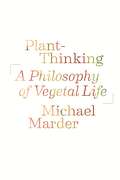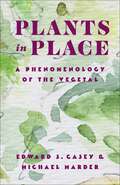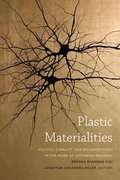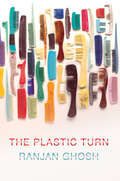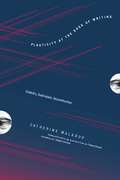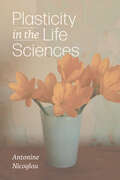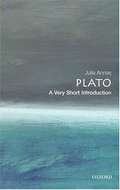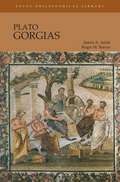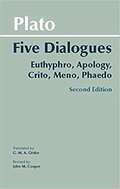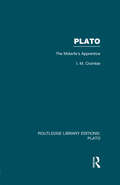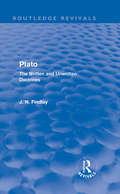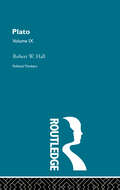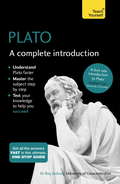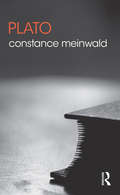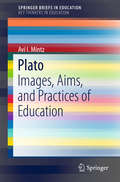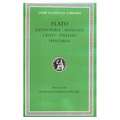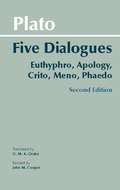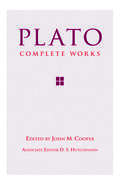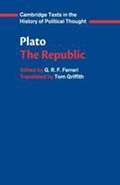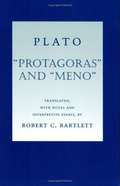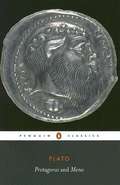- Table View
- List View
Plant-Thinking: A Philosophy of Vegetal Life
by Michael MarderThe margins of philosophy are populated by non-human, non-animal living beings, including plants. While contemporary philosophers tend to refrain from raising ontological and ethical concerns with vegetal life, Michael Marder puts this life at the forefront of the current deconstruction of metaphysics. He identifies the existential features of plant behavior and the vegetal heritage of human thought so as to affirm the potential of vegetation to resist the logic of totalization and to exceed the narrow confines of instrumentality. Reconstructing the life of plants "after metaphysics," Marder focuses on their unique temporality, freedom, and material knowledge or wisdom. In his formulation, "plant-thinking" is the non-cognitive, non-ideational, and non-imagistic mode of thinking proper to plants, as much as the process of bringing human thought itself back to its roots and rendering it plantlike.
Plant-Thinking: A Philosophy of Vegetal Life
by Michael MarderThe margins of philosophy are populated by non-human, non-animal living beings, including plants. While contemporary philosophers tend to refrain from raising ontological and ethical concerns with vegetal life, Michael Marder puts this life at the forefront of the current deconstruction of metaphysics. He identifies the existentials features of plant behavior and the vegetal heritage of human thought so as to affirm the potential of vegetation to resist the logic of totalization and to exceed the narrow confines of instrumentality. Reconstructing the life of plants "after metaphysics," Marder focuses on their unique temporality, freedom, and material knowledge or wisdom. In his formulation, "plant-thinking" is the non-cognitive, non-ideational, and non-imagistic mode of thinking proper to plants, as much as the process of bringing human thought itself back to its roots and rendering it plantlike.
Plants in Place: A Phenomenology of the Vegetal (Critical Life Studies)
by Edward S. Casey Michael MarderPlants are commonly considered immobile, in contrast to humans and other animals. But vegetal existence involves many place-based forms of change: stems growing upward, roots spreading outward, fronds unfurling in response to sunlight, seeds traveling across wide distances, and other intricate relationships with the surrounding world. How do plants as sessile, growing, decaying, and metamorphosing beings shape the places they inhabit, and how are they shaped by them? How do human places interact with those of plants—in lived experience; in landscape painting; in cultivation and contemplation; in forests, fields, gardens, and cities?Examining these questions and many more, Plants in Place is a collaborative study of vegetal phenomenology at the intersection of Edward S. Casey’s phenomenology of place and Michael Marder’s plant-thinking. It focuses on both the microlevel of the dynamic constitution of plant edges or a child’s engagement with moss and the macrolevel of habitats that include the sociality of trees. This compelling portrait of plants and their places provides readers with new ways to appreciate the complexity and vitality of vegetal life. Eloquent, descriptively rich, and insightful, the book also shows how the worlds of plants can enhance our understanding and experience of place more broadly.
Plastic Materialities: Politics, Legality, and Metamorphosis in the Work of Catherine Malabou
by Jonathan Goldberg-Hiller Brenna BhandarCatherine Malabou's concept of plasticity has influenced and inspired scholars from across disciplines. The contributors to Plastic Materialities--whose fields include political philosophy, critical legal studies, social theory, literature, and philosophy--use Malabou's innovative combination of post-structuralism and neuroscience to evaluate the political implications of her work. They address, among other things, subjectivity, science, war, the malleability of sexuality, neoliberalism and economic theory, indigenous and racial politics, and the relationship between the human and non-human. Plastic Materialities also includes three essays by Malabou and an interview with her, all of which bring her work into conversation with issues of sovereignty, justice, and social order for the first time.Contributors. Brenna Bhandar, Silvana Carotenuto, Jonathan Goldberg-Hiller, Jairus Victor Grove, Catherine Kellogg, Catherine Malabou, Renisa Mawani, Fred Moten, Alain Pottage, Michael J. Shapiro, Alberto Toscano
The Plastic Turn
by Ranjan GhoshThe Plastic Turn offers a novel way of looking at plastic as the defining material of our age and at the plasticity of plastic as an innovative means of understanding the arts and literature. Ranjan Ghosh terms this approach the material-aesthetic and, through this concept, traces the emergence and development of plastic polymers along the same historical trajectory as literary modernism. Plastic's growth as a product in the culture industry, its formation through multiple application and chemical syntheses, and its circulation via oceanic movements, Ghosh argues, correspond with, and offers novel insights into, developments in modernist literature and critical theory.Through innovative readings of canonical modernist texts, analyses of art works, and accounts of plastic's devastating environmental impact, The Plastic Turn proposes plastic's unique properties and destructive ubiquity as a "theory machine" to explain literature and life in the Anthropocene. Introducing several new concepts (like plastic literature, plastic literary, etc.) into critical-humanist discourse, Ghosh enmeshes literature and theory, materiality and philosophy, history and ecology, to explore why plastic as a substance and as an idea intrigues, disturbs, and haunts us.
Plasticity at the Dusk of Writing: Dialectic, Destruction, Deconstruction (Insurrections: Critical Studies in Religion, Politics, and Culture)
by Catherine MalabouA former student and collaborator of Jacques Derrida, Catherine Malabou has generated worldwide acclaim for her progressive rethinking of postmodern, Derridean critique. Building on her notion of plasticity, a term she originally borrowed from Hegel's Phenomenology of Spirit and adapted to a reading of Hegel's own work, Malabou transforms our understanding of the political and the religious, revealing the malleable nature of these concepts and their openness to positive reinvention. In French to describe something as plastic is to recognize both its flexibility and its explosiveness-its capacity not only to receive and give form but to annihilate it as well. After defining plasticity in terms of its active embodiments, Malabou applies the notion to the work of Hegel, Heidegger, Levinas, Levi-Strauss, Freud, and Derrida, recasting their writing as a process of change (rather than mediation) between dialectic and deconstruction. Malabou contrasts plasticity against the graphic element of Derrida's work and the notion of trace in Derrida and Levinas, arguing that plasticity refers to sculptural forms that accommodate or express a trace. She then expands this analysis to the realms of politics and religion, claiming, against Derrida, that "the event" of justice and democracy is not fixed but susceptible to human action.
Plasticity in the Life Sciences
by Antonine NicoglouAnalyzes the reasons why biologists have referred to and continue to refer to plasticity. Plasticity has become an important topic in biology, with some even wondering if it has now acquired the theoretical importance in biology that the concept of the gene enjoyed at the beginning of the last century. In this historical and epistemological study, philosopher Antonine Nicoglou shows how the recurrence of the general idea of plasticity—throughout the history of the life sciences—indicates its essential role in the way we think about life processes. Although plasticity has become a key element in new evolutionary thinking, she argues, its role in contemporary biology is also not insignificant. Rather, as mobilized in contemporary biology, plasticity most often seeks to account for the specific nature of living systems. The book is divided into two parts. The first takes up the history of plasticity from Aristotle to contemporary biology; the second part offers an original way of distinguishing between different phenomena described by “plasticity.” In the process, the author explores what has led some biologists to speak of plasticity as a way of overcoming genetic determinism.
Plato: A Very Short Introduction
by Julia AnnasJulia Annas covers Plato's style of writing, and delves into discussions of love and philosophy, his attitude towards women and towards homosexual love. Finally, she explores Plato's claim that virtue is sufficient for happiness and touches on his arguments for the immorality of the soul and his ideas about the nature of the universe.
Plato: Gorgias
by Roger M. Barrus James A. Arieti PlatoThis is an English translation of Plato's dialogue of Socrates seeking the true definition of rhetoric, with an attempt to show the flaws of the sophistic orators. Includes speeches from Thucydides' History of the Peloponnesian Wars that reflect Plato's themes. Focus Philosophical Library translations are close to and are non-interpretative of the original text, with the notes and a glossary intending to provide the reader with some sense of the terms and the concepts as they were understood by Plato's immediate audience.
Plato: Euthyphro, Apology, Crito, Meno, Phaedo (second edition)
by John M. Cooper G. M. A. Grube PlatoSocrates was a well-known character, expounding his philosophy of life in the streets of Athens to anyone who cared to listen.
Plato: The Midwife's Apprentice (Routledge Library Editions: Plato)
by I M CrombieIn Plato’s Theaetetus, Socrates is portrayed as a midwife to the intellect, a metaphor for his task as a dialectician as he seeks to help give birth to wisdom. Thus it is that the author refers to Plato as the midwife’s apprentice. This volume represents an attempt to provide a more manageable account of the author’s two volume magnum opus, An Examination of Plato’s Doctrines. An accessible and lucid introduction to Plato’s ideas is provided which nonetheless challenges traditional interpretations. In particular the author is concerned to offer an interpretation of the significance of what Plato said. The chapters are arranged by topic, for ease of comprehension.
Plato: The Republic
by G. R. F. Ferrari Tom GriffithThis is a completely new translation of one of the great works of Western political thought. In addition to Tom Griffith's vivid, dignified and accurate rendition of Plato's text, this edition is suitable for students at all levels. It contains an introduction that assesses the cultural background to the Republic, its place within political philosophy, and its general argument; succinct notes in the text; an analytical summary of content; a full glossary of proper names; a chronology of important events; and a guide to further reading.
Plato: Plato: The Written and Unwritten Doctrines (Routledge Revivals)
by John Niemeyer FindlayJ.N. Findlay, distinguished scholar and acknowledged expert on Plato, argues persuasively for a new interpretation of the Platonic writings. He believes that Plato's Unwritten Doctrines were present in the background of all the great philosopher's mature written work. With the use of Aristotelian and other writings on these reported doctrines he demonstrates that they admit of an intelligible elucidation and they direct indispensable light upon the full meaning of the written Dialogues. The author emphasizes the valuable use of Platonic notions and methods by the Neoplatonists and the Schoolmen as well as by such modern thinkers as Husserl and Russell. He also censures, as a great misinterpretation, the widespread Aristotelian view of Platonism as a two-world theory, and argues that, for Plato, the Ideas and their Principles alone have full reality, everything else being logically parasitic upon them. The work also includes two important Appendices, the first providing translations of the Aristotelian and other ancient material regarding Plato's oral teaching, the second criticizing and refuting the views of Harold F. Cherniss on the same material.
Plato (Political Thinkers Ser. #Vol. 9)
by Robert HallFirst published in 1981 this unique study discusses the evolution of Plato's thought through the actual developments in Athenian democracy, the book also demonstrates Plato's continuing responses to changes in political theory and argues for a new understanding of Plato's goals for the state and his ultimate concern for the moral well-being of the citizens.
Plato: Teach Yourself
by Roy JacksonWritten by Dr Roy Jackson, who Senior Lecturer at the University of Gloucestershire, Plato: A Complete Introduction is designed to give you everything you need to succeed, all in one place. It covers the key areas that students are expected to be confident in, outlining the basics in clear jargon-free English, and then providing added-value features like summaries of key books, and even lists of questions you might be asked in your seminar or exam. The book uses a structure that mirrors the way Plato is taught on many university courses, with chapters including: the pre-socratics; Socrates; who was Plato?; can virtue be taught?; piety; the philosophical life; obeying the law of Athens; the Soul; knowledge as recollection; the forms; Plato's state; education and morality; Plato and art; the Later Period; Aristotle, Plato's great pupil; Neoplatonism; Plato and religion; Plato's legacy.
Plato
by M. C. Howatson Frisbee C. C. Sheffield M. C. Howatson Frisbee C. C. SheffieldPlato's Symposium, written in the early part of the 4th century BC, is set at a drinking party (symposium) attended by some of the leading intellectuals of the day, including Aristophanes, the comic dramatist, Socrates, Plato's mentor, and Alcibiades, the brilliant but (eventually) treacherous politician. Each guest gives a speech in praise of the benefits of desire and its role in the good and happy human life. At the core of the work stands Socrates' praise of philosophical desire, and an argument for the superiority of the philosophical life as the best route to happiness. This edition provides an accessible and engaging new translation by M. C. Howatson, and a substantial introduction, by Frisbee Sheffield, which guides the reader through the various parts of the dialogue and reflects on its central arguments. A chronology and detailed notes on the participants help to set this enduring work in context.
Plato (The Routledge Philosophers)
by Constance MeinwaldIn this engaging introduction, Constance Meinwald shows how Plato has shaped the landscape of Western philosophy. She provides much-needed historical context, and helps readers grapple with Plato’s distinctive use of highly crafted literary masterpieces for philosophical purposes. Meinwald examines some of Plato’s most famous discussions of human questions, concerning erōs, the capacities and immortality of our psyche, human excellence and the good life, and Plato’s controversial ideas about culture, society, and political organization. She shows how Plato makes a sketch of his theory of Forms foundational in this work, and she offers illuminating readings of texts concerned with the development of the theory and its relationship to Greek science and mathematics. Throughout, Meinwald draws expertly on Plato’s dialogues to present a lively and accessible picture of his philosophy. Including a chronology, glossary of terms, and suggestions for further reading, Plato is an ideal introduction to arguably the greatest of all Western philosophers, and is essential reading for students of ancient philosophy and classics.
Plato: Images, Aims, And Practices Of Education (SpringerBriefs in Education)
by Avi I. MintzThis book opens by providing the historical context of Plato’s engagement with education, including an overview of Plato’s life as student and educator. The author organizes his discussion of education in the Platonic Corpus around Plato’s images, both the familiar – the cave, the gadfly, the torpedo fish, and the midwife – and the less familiar – the intellectual aviary, the wax tablet, and the kindled fire. These educational images reveal that, for Plato, philosophizing is inextricably linked to learning; that is, philosophy is fundamentally an educational endeavor. The book concludes by exploring Plato’s legacy in education, discussing the use of the “Socratic method” in schools and the Academy’s foundational place in the history of higher education. The characters in Plato’s dialogues often debate – sometimes with great passion – the purpose of education and the nature of learning. The claims about education in the Platonic corpus are so provocative, nuanced, insightful, and controversial that educational philosophers have reckoned with them for millennia.
Plato: Euthyphro, Apology Crito, Phaedo, Phaedrus (Loeb Classical Library #Volume 36)
by PlatoPlato, the great philosopher of Athens, was born in 427 BCE. In early manhood an admirer of Socrates, he later founded the famous school of philosophy in the grove Academus. Much else recorded of his life is uncertain; that he left Athens for a time after Socrates' execution is probable; that later he went to Cyrene, Egypt, and Sicily is possible; that he was wealthy is likely; that he was critical of 'advanced' democracy is obvious.
Plato: Euthyphro, Apology, Crito, Meno, Phaedo (Hackett Classics)
by PlatoThe second edition of Five Dialogues presents G. M. A. Grube's distinguished translations, as revised by John Cooper for Plato, Complete Works. A number of new or expanded footnotes are also included along with an updated bibliography.
Plato: Complete Works
by PlatoOutstanding translations by leading contemporary scholars--many commissioned especially for this volume--are presented here in the first single edition to include the entire surviving corpus of works attributed to Plato in antiquity. In his introductory essay, John Cooper explains the presentation of these works, discusses questions concerning the chronology of their composition, comments on the dialogue form in which Plato wrote, and offers guidance on approaching the reading and study of Plato's works.Also included are concise introductions by Cooper and Hutchinson to each translation, meticulous annotation designed to serve both scholar and general reader, and a comprehensive index. This handsome volume offers fine paper and a high-quality Smyth-sewn cloth binding in a sturdy, elegant edition.
Plato: The Republic (Cambridge Texts in the History of Political Thought)
by PlatoPlato's Republic is the first great work of Western political philosophy. This is a completely new translation of one of the great works of Western political thought. It contains an introduction that assesses the cultural background to the Republic, its place within political philosophy, and its general argument; succinct notes in the text; an analytical summary of content; a full glossary of proper names; a chronology of important events; and a guide to further reading. Edited and translated by Tom Griffith, G. R. F. Ferrari
Plato: Protagoras and Meno
by Plato Robert C. BartlettThis volume contains new translations of two dialogues of Plato, the Protagoras and the Meno, together with explanatory notes and substantial interpretive essays. Robert C. Bartlett's translations are as literal as is compatible with sound English style and take into account important textual variations. Because the interpretive essays both sketch the general outlines of the dialogues and take up specific theoretical or philosophic difficulties, they will be of interest not only to those reading the dialogues for the first time but also to those already familiar with them. The Protagoras and the Meno are linked by the attention each pays to the idea of virtue: the latter dialogue focuses on the fundamental Socratic question, "What is virtue?"; the former on the specific virtue of courage, especially in its relation to wisdom. An appendix contains a short extract from Xenophon's Anabasis of Cyrus that vividly portrays the figure of Meno.
Plato: Protagoras and Meno
by Plato Adam Beresford Lesley BrownPlato's finest dramatic work, an entertaining tale of goodness and knowledge Exploring the question of what exactly makes good people good, Protagoras and Meno are two of the most enjoyable and accessible of all of Plato's dialogues. Widely regarded as his finest dramatic work, the Protagoras, set during the golden age of Pericles, pits a youthful Socrates against the revered sophist Protagoras, whose brilliance and humanity make him one the most interesting and likeable of Socrates' philosophical opponents, and turns their encounter into a genuine and lively battle of minds. The Meno sees an older but ever ironic Socrates humbling a proud young aristocrat as they search for a clear understanding of what it is to be a good man, and setting out the startling idea that all human learning may be the recovery of knowledge already possessed by our immortal souls.
Plato
by David Sedley Alex LongThe Clitophon, a dialogue generally ascribed to Plato, is significant for focusing on Socrates' role as an exhorter of other people to engage in philosophy. It was almost certainly intended to bear closely on Plato's Republic and is a fascinating specimen of the philosophical protreptic, an important genre very fashionable at the time. This is the first critical edition of this dialogue to be published in nearly seventy years. Professor Slings here provides a text based on new examination of all relevant manuscripts and accompanies it with a translation. His extensive introduction studies philosophical exhortation in the classical era, and tries to account for Plato's dialogues in general as a special type of exhortation. The Clitophon is seen as a defence of the Platonic dialogue. The commentary, the first ever to be published in English, elucidates the Greek and discusses many passages where the meaning is not entirely clear.
